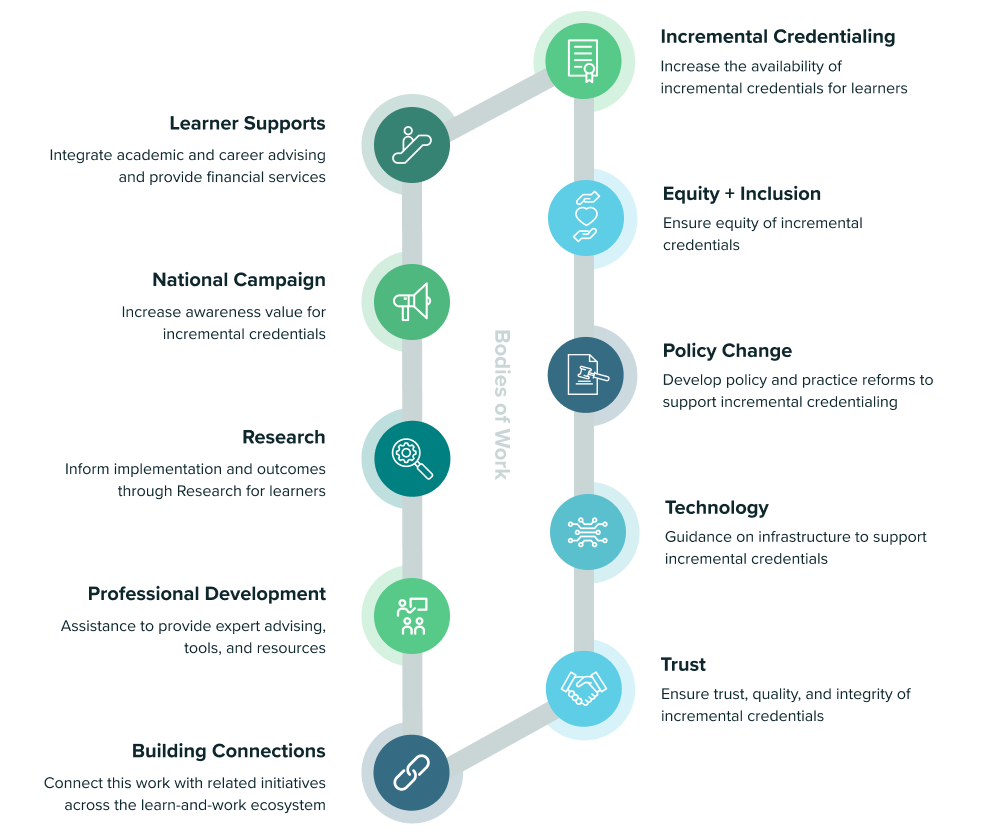Cornerstones
- About
CORNERSTONES
Cornerstones
Credential As You Go focuses on ten bodies of work. The Cornerstones lay out the mission, vision, and principles of the national initiative.
FOUNDATION
Why Does Credential As You Go Matter?
The U.S. needs a postsecondary system that captures and validates uncounted learning to enable all individuals to be recognized for what they know and can do to further their education and career goals. Incremental credentialing seals learning into qualifications that are recognizable, transferable, and usable to gain and sustain employment and continue education. Credential As You Go works with partners to further these goals.
The differentials of employment and income between those who do/do not have a college degree are significant. For too many learners, the only postsecondary credentials that count for employment are degrees. This focus on degrees limits those who attend college but do not earn a degree, as well as those who’ve acquired skills and knowledge through life and work experience — often treating them as if they have no postsecondary-level learning. Contemporary issues have increased these disparities, with millions needing to upskill and reskill to remain or become employed.
FOCUS
Mission


FUTURE
Vision
Credential As You Go envisions an incremental credentialing ecosystem in which all learners are recognized for what they know and can do as they acquire learning from multiple sources. The meaning of those credentials will be understood by learners, employers, and educational institutions. Learners will be able to earn credentials to fit their needs and inform their education-career planning, including job transitions. These credentials will be used by employers in hiring and advancement and recognized within the postsecondary ecosystem as counting towards further learning.
APPROACH
Principles
Incremental credentials should:
- Be learner–centered. Incremental credentials should be designed and implemented with learners in mind with respect to content, access and delivery. They should empower learners, giving them the resources to tailor their educational and career journeys to their unique needs.
- Increase equity and inclusion. Credential As You Go is committed to using incremental credentials to increase postsecondary educational accessibility, attainment, and employment opportunities for all learners, especially those historically underserved by race/ethnicity, gender, age, disability, and income.
- Be understandable and inclusive. Incremental credentials should reflect what holders know and can do, making them easy to understand for all users of credentials, including learners, employers, educators, workforce agencies, accreditors, and policymakers.
- Be trusted. Users must be able to rely on the representations of credentials, including their accuracy in documenting the credential holder’s knowledge and skills and the usability of the credential to meet their goals.
- Carry value. Incremental credentials must carry value, enabling upskilling, finding employment, and counting towards further learning.
- Be interconnected. Users must understand how credentials connect and see multiple pathways to increase education, career, and economic mobility.
- Be incorporated into technology solutions. Initiatives creating interoperable data standards and tools (e.g., enterprise systems/unit record data/auditing, portable comprehensive learner records, national collection systems, learning management systems) should be designed to include the array of incremental credentials.
- Be informed by a community of stakeholders. Diverse stakeholder engagement from faculty, student services, employers, practitioners, and learners is crucial to developing high-quality incremental credentials based on evidence of the need and purpose.
- Be affordable. Cost must not be a barrier to learners earning incremental credentials.
- Be forward-relevant. The design of incremental credentials should reflect the needs of the 21st Century economy, connecting higher education’s contributions to workforce development.
MOVING THE NEEDLE
To transform the U.S. legacy degree system to a nationally recognized incremental credentialing system, Credential As You Go focuses on ten bodies of work



